
Winston Raymond Peters is a New Zealand politician who has been the leader of New Zealand First since it was founded in 1993. He was re-elected for a fifteenth time at the 2023 general election, having previously been a member of Parliament (MP) from 1979 to 1981, 1984 to 2008 and 2011 to 2020. Peters has served as the 13th deputy prime minister of New Zealand and 25th minister of foreign affairs since November 2023.
New Zealand First, commonly abbreviated to NZ First or NZF, is a political party in New Zealand, led by and identified with veteran politician Winston Peters, who has served three times as deputy prime minister. The party has formed coalition governments with both major political parties in New Zealand: with the New Zealand National Party from 1996 to 1998 and 2023 to present, and with the New Zealand Labour Party from 2005 to 2008 and 2017 to 2020. New Zealand First currently serves in a coalition government with both National and ACT as part of the Sixth National government, having won 6.08% of the total party vote in the 2023 New Zealand general election.

The Serious Fraud Office (SFO) is a non-ministerial government department of the Government of the United Kingdom that investigates and prosecutes serious or complex fraud and corruption in England, Wales and Northern Ireland. The SFO is accountable to the Attorney General for England and Wales, and was established by the Criminal Justice Act 1987, an Act of the Parliament of the United Kingdom.
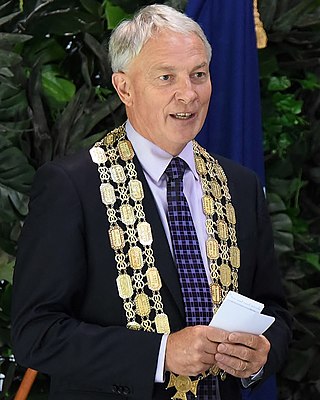
Philip Bruce Goff is a New Zealand politician and diplomat. He currently serves as High Commissioner of New Zealand to the United Kingdom since 2023. He was a member of the New Zealand Parliament from 1981 to 1990 and again from 1993 to 2016. He served as leader of the Labour Party and leader of the Opposition between 11 November 2008 and 13 December 2011.
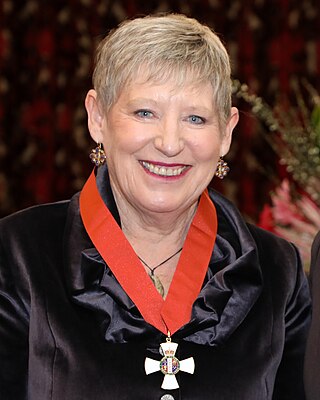
Lianne Audrey Dalziel is a New Zealand politician and former Mayor of Christchurch. Prior to this position, she was a member of the New Zealand Parliament for 23 years, serving as Minister of Immigration, Commerce, Minister of Food Safety and Associate Minister of Justice in the Fifth Labour Government. She resigned from Cabinet on 20 February 2004 after apparently lying about a leak of documents to the media, but was reinstated as a Minister following Labour's return to office after the 2005 election. She resigned from Parliament effective 11 October 2013 to contest the Christchurch mayoral election. The incumbent, Bob Parker, decided not to stand again. She was widely regarded as the top favourite and won with a wide margin to become the 46th Mayor of Christchurch.
Alan Ross Meurant is a New Zealand public figure, now Honorary Consul for Morocco, who has at various times gained public attention as a police officer, businessman, politician, and political lobbyist.
Tuariki John Edward Delamere is a former New Zealand politician and athlete. He was elected to the New Zealand House of Representatives in the Te Tai Rawhiti electorate, representing the New Zealand First party, in the 1996 New Zealand general election. He was later a member of the Te Tawharau party, before losing his seat in 1999.
Gilbert Colin Myles is a former New Zealand politician who entered Parliament for the National Party in 1990, then split from the party in 1991 and sat as an independent, before representing the Liberal Party, the Alliance and the New Zealand First party.

The Commission of Inquiry into Certain Matters Relating to Taxation, popularly known as the Winebox Inquiry, was an inquiry undertaken in New Zealand to investigate claims of corruption and incompetence in the Serious Fraud Office (SFO) and Inland Revenue Department (IRD).
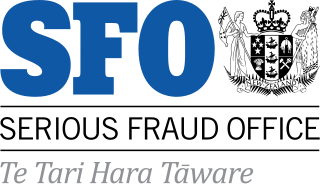
The Serious Fraud Office is the public service department of New Zealand charged with detecting, investigating and prosecuting financial crimes, including corruption, of a serious and complex nature.

The 2008 New Zealand general election was held on 8 November 2008 to determine the composition of the 49th New Zealand Parliament. The liberal-conservative National Party, headed by its parliamentary leader John Key, won the largest share of votes and seats, ending nine years of government by the social-democratic Labour Party, led by Helen Clark. Key announced a week later that he would lead a National minority government with confidence-and-supply support from the ACT, United Future and Māori parties. The Governor-General swore Key in as New Zealand's 38th Prime Minister on 19 November 2008. This marked the beginning of the Fifth National Government which governed for the next nine years, until the 2017 general election, when a government was formed between the Labour and New Zealand First parties, with support on confidence and supply by the Green Party.

Simon Joseph Bridges is a former New Zealand politician and lawyer. He served as Leader of the National Party and Leader of the Opposition between 2018 and 2020, and as the Member of Parliament for Tauranga from the 2008 election to May 2022, when he resigned.

Allan James Hubbard was a businessman who lived in Timaru in the South Island of New Zealand, and was the founder of South Canterbury Finance, New Zealand's largest locally owned finance company. In 2006, the New Zealand Listener described Hubbard as the most powerful businessman in the South Island.

Jami-Lee Matenga Ross is a New Zealand businessman and former politician. He was the Member of Parliament for Botany from a by-election in March 2011 until he lost his re-election bid at the 2020 general election.
South Canterbury Finance was New Zealand's largest locally owned finance company when it collapsed in August 2010, triggering a $1.6 billion bail-out of investors deposits by the New Zealand Government; almost $1 billion was recovered by receivers.
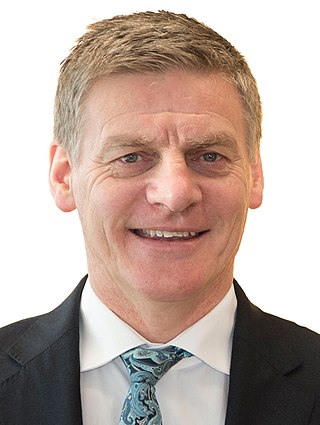
The 2017 New Zealand general election took place on Saturday 23 September 2017 to determine the membership of the 52nd New Zealand Parliament. The previous parliament was elected on 20 September 2014 and was officially dissolved on 22 August 2017. Voters elected 120 members to the House of Representatives under New Zealand's mixed-member proportional (MMP) voting system, a proportional representation system in which 71 members were elected from single-member electorates and 49 members were elected from closed party lists. Around 3.57 million people were registered to vote in the election, with 2.63 million (79.8%) turning out. Advance voting proved popular, with 1.24 million votes cast before election day, more than the previous two elections combined.
Clayton Robert Henry Mitchell is a former New Zealand politician. He was elected to the New Zealand parliament at the 2014 general election as a representative of New Zealand First and served two terms, leaving Parliament in 2020.
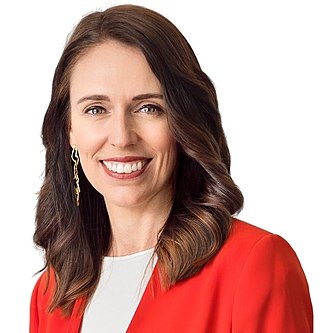
The 2020 New Zealand general election was held on Saturday 17 October 2020 to determine the composition of the 53rd New Zealand Parliament. Voters elected 120 members to the House of Representatives, 72 from single-member electorates and 48 from closed party lists. Two referendums, one on the personal use of cannabis and one on euthanasia, were also held on the same day. Official results of the election and referendums were released on 6 November.

The Advance New Zealand Party was a short-lived political party in New Zealand from 2020 to 2021. The idea was first unveiled in a newsletter from founder Jami-Lee Ross in April 2020. Ross has claimed that the party was a centrist and anti-corruption movement designed to appeal to voters "in the middle"; however, their main policies represent the political fringe rather than centre.












